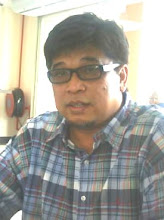Real or aliases, they are the names used by a Singaporean terrorist.
He is an Indian Muslim linked to regional terror network Jemaah Islamiah (JI), with skills in logistics and financial planning. He is now working as a ‘consultant’ to Filipino bandit group Abu Sayyaf.
This is what security expert Rommel Banlaoi told The Sunday Times.
The academic was in Singapore last week to release his book, Philippine Security In The Age Of Terror.
 Some reports had suggested that Muaiya could have been killed in a Philippine counter-terror operation earlier this year, but Professor Banlaoi said his information suggests that the terrorist is still alive.
Some reports had suggested that Muaiya could have been killed in a Philippine counter-terror operation earlier this year, but Professor Banlaoi said his information suggests that the terrorist is still alive.Muaiya is, in fact, helping senior Abu Sayyaf leaders prepare their terror operations, the head of the Philippine Institute for Peace, Violence and Terrorism Research said.
A Singapore Home Affairs Ministry spokesman said officials in Singapore have been in touch with the Philippine authorities on this issue but added that they are unable to disclose any other details.
Muaiya’s skills are said to be so good that slain JI leader Noordin Top once sought his help to secure M-16 rifles and rocket grenades.
Noordin, the hardline JI leader behind most of the major bombings in Indonesia, was killed in a security operation a few months ago.
Banlaoi, who has taught at the Philippine National Defence College, still works with the government on strategic issues.
Noordin, the hardline JI leader behind most of the major bombings in Indonesia, was killed in a security operation a few months ago.
Banlaoi, who has taught at the Philippine National Defence College, still works with the government on strategic issues.
He said Muaiya, who is in touch with senior JI leaders in the Philippines like Umar Patek and Dulmatin, works with a faction of the Abu Sayyaf that has ‘ground control’ over operations.
Muaiya reportedly left Singapore some years before the Sept 11, 2001 attacks in the United States and the subsequent uncovering of JI cells in Singapore and elsewhere in the region.
According to Jakarta-based think-tank International Crisis Group, he was not a member of the JI cell broken up by the Singapore authorities in 2001.
Security experts became aware of Muaiya’s presence in the Philippines earlier this year when the Abu Sayyaf took as hostage three Red Cross workers in Mindanao.
The Indian Muslim was reportedly seen moving hostages about in Mindanao, while acting as a media spokesman.
The Indian Muslim was reportedly seen moving hostages about in Mindanao, while acting as a media spokesman.
Banlaoi said from his information, Muaiya is part of a group of between 25 and 40 JI members and a few foreign jihadists who are training the Abu Sayyaf.
He reports to at least one senior Abu Sayyaf leader, Isnilon Hapilon.
An upsurge in kidnappings suggests that the bandit group is financially stronger than it was before and continues to mobilise resources.
Banlaoi said the security situation in Mindanao is worrying, with newer bandit groups emerging even as older ones maintain links with one another.
In the most recent incident, the newly identified Bangsamoro National Liberation Army was involved in the killing of two American soldiers this month, he said.
Besides the Abu Sayyaf, Mindanao is also home to the Moro Islamic Liberation Front, among other militant groups.
“They are getting financial resources, but the government’s efforts to counter them are hampered,” Prof Banlaoi said, adding that Filipino militant groups may seek to extend their tentacles by getting involved in regional operations as well. — Straits Times
.png)








No comments:
Post a Comment